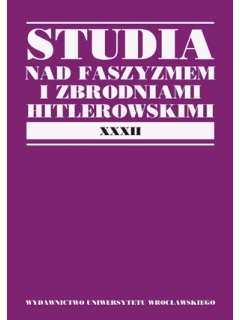

Articles

GIOVANNI PAPINI. FROM AESTHETIC NATIONALISM TO POLITICAL FUTURISM 1903–1914
The article is devoted to the evolution of political ideas of Italian writer, philosopher and literary critic Giovanni Papini in the 1903–1914 period against the background of the Italian Nationalism’s and political Futurism’s development. Papini was a representative of „Aesthetic Nationalism” which constituted the first phase of the development of Nationalist movement in Italy which encompassed 1903–1910 period. At the beginning his most important political ideas were presented in literary journals „Leonardo” which Papini co-founded with Giuseppe Prezzolini in 1902 and „Il Regno” created in 1903. Papini was an exponent of different branch of ideology in relation to the main program line of the Nationalist movement as set by Enrico Corradini. Similarly to other Nationalists, he proclaimed anti-democratic, anti-liberal and anti-socialist doctrines, emphasized Italy’s primacy due to the chosen status of Roman race-stirpe Latina and argued that bourgeoisie should perform a crucial function in national society’s organization. In particularly strong terms Papini rallied against democratic mentality which in his opinion was nothing but a remnant of humanitarian positivism and late Romantic sentimentalism. The characteristic features of Papini’s political thought were his identification of bourgeoisie with the nation itself, concept of „higher culture” and insistence on „national revival”. Although at the beginning, following Mario Morasso, he attributed to intellectuals a special role in the organization of national society the idea of writer’s party, later on Papini deviated from this concept and entrusted the mission of national revival to industrial bourgeoisie. At the same time he promulgated other ideas which in time became permanent fixtures in Nationalist propaganda like, for instance, glorification of great military campaigns, apotheosis of war and disdainful contempt for „all those who were unable to raise themselves to the aristocratic concept of individual and communal life”. Papini was different from the „father of Italian Nationalism” with respect to many other important issues, for example in his attitudes towards imperialism and irredentism, views of domestic policies or understanding of historical tradition. These differences, revealed on the ideological level, led to the departure of Florentine writer from Nationalist movement and to his founding of new journal „La Voce” in 1908 which was of distinctly separate ideological character. After an ultimate victory of Enrico Corradini’s political program which happened during the First Congress of ANI in Florence in 1910, Papini became closely involved with political Futurism. This allegiance was finalized in 1913. Contrary to Nationalists linked with Corradini who perceived military expansion as a proper solution for Italy’s domestic economic problems, Papini recognized a significance of such problems as backwardness of South so-called Questione Meridionale, expanding bureaucratic system and degeneration of parliamentarianism. He also considered finding a solution to social-and-economic problems to be have a priority over foreign policy conquests in Albania and Tripolitania and territorial revendication of Trieste, Trident and Dalmatia. Papini’s association with Filippo Tommaso Marinetti’s Futurist movement which had a lot in common with Nationalism hence the term „Modernist Nationalism” was based primarily on his attitude towards modernity, disapproval of official academic culture with simultaneous rejection of scholasticism and existing university institutions, fight against old forms both in art and in politics, repudiation of the Triple Alliance, irredentism, the concept of Roman War and the idea of intellectualist’s party cultivated by Papini in his youth. Similarly to Futurists, Papini propagated a cult of inventions and technical progress and rejected historical traditions particularly the one connected with ancient Rome which were especially dear to Nationalists who surrounded Corradini.